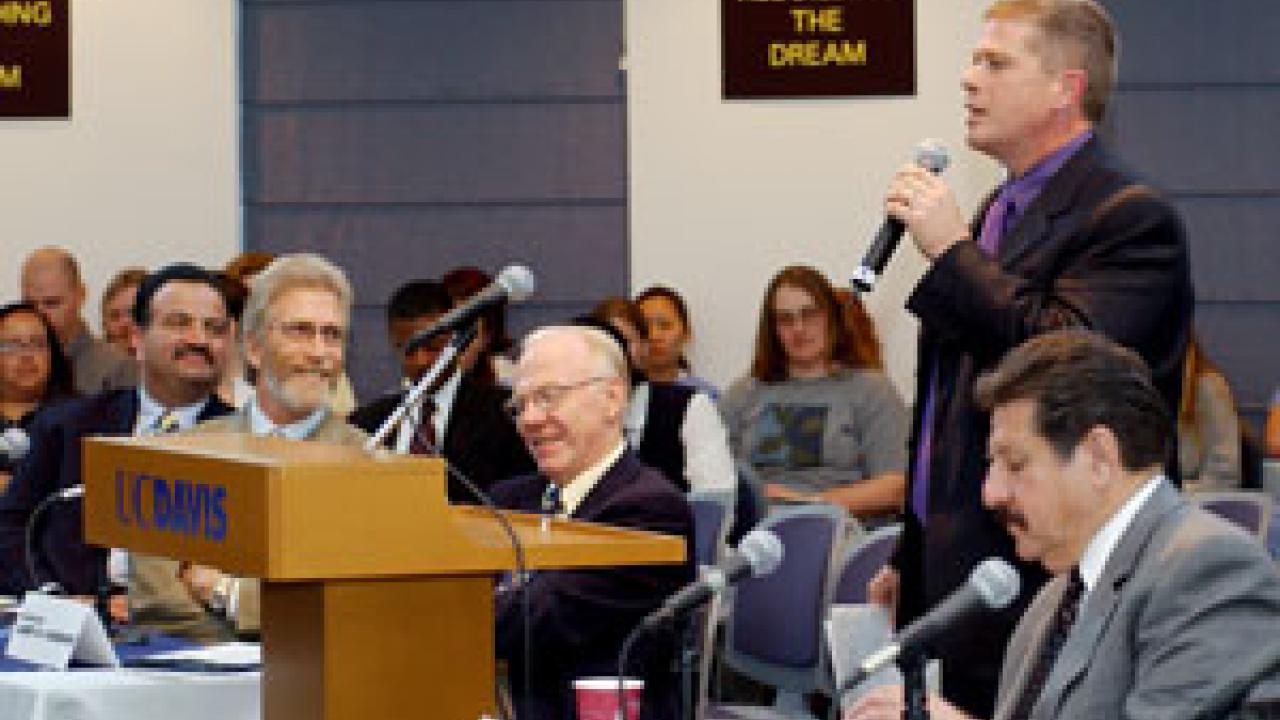The UC system is vital to the state's economy, but hefty budget cuts will jeopardize the future, say supporters.
Rallying behind that message were more than 180 students, faculty and administrators who converged last Friday at a town hall meeting to react to proposed tuition hikes and budget cuts. Facing large fee hikes, nearly 80 veterinary medicine students filled the room, clad in their blue scrubs.
"It's a very practical matter to invest in universities," Chancellor Larry Vanderhoef told the standing-room-only crowd in the Alumni and Visitors Center.
The town hall was the first of four such events sponsored by the State Senate Majority Caucus. Others will be held at California State University campuses in Los Angeles and San Jose and also at UC San Diego. Gov. Arnold Schwarzenegger's proposed 2004-05 state higher education budget would reduce UC freshman enrollment by 10 percent, hike resident graduate student fees by 40 percent, significantly increase professional school fees, and downsize financial aid funding.
Vanderhoef noted that UC Davis contributed $2.7 billion to the California economy in 2001-02 and generated 45,000 jobs. Also at UC Davis, for every public dollar invested in the campus, the state receives $5 in return.
"That's a good investment by any measure," the chancellor said. He added that universities deliver economic value by creating jobs and nurturing California's most important asset -- a highly skilled workforce.
The proposed budget would cut state funds for UC by 8 percent, or $372 million, and scale back spending on programs at California State University by 9 percent, or $240 million. Cuts to UC Davis total some $15 million.
In response to questions from veterinary school students, Vanderhoef expressed concern. The students, who may accumulate more than $100,000 in student loan debt, likely will make far less than medical or law school graduates, and yet would still face 40 percent fee hikes. "It makes no sense at all," Vanderhoef said.
Agreeing was Paula Thomas, a veterinary medicine student. She is worried that her student debt could skyrocket to $150,000. "The fees have already increased twice since I've been here," she said. "Our starting salaries don't reflect that we'll be able to pay that."
California State Sen. Mike Machado, D-Linden, told the audience that California's budget should reflect the "values and priorities of our society."
"It's so important to express how this proposed budget is going to impact you," said Machado, who had planned to host the discussion, but had return to the Capitol for a vote on workers compensation reform.
Machado urged the attendees to contact their legislators and the governor's office to register their concern about higher education cuts. He said the proposed state budget cuts will challenge the economic impact of UC across California. And the fee hikes will close the doors for many would-be students.
"To deny access is to deny our future," said Machado. "We can't come back and try to rebuild and return to where we are."
Industry leaders touted the real-world value of higher education. "The university adds to the quality of life and the pocketbook of the state," said Timothy Mondavi, vice chairman of the Robert Mondavi wine company and a graduate of UC Davis. "There is a clear connection between industry and UC Davis," Mondavi said.
For example, a few years ago, work by UC Davis researchers helped halt the spread of the glassy-winged sharpshooter, which would have devastated the wine and grape markets.
Steven Sheffrin, dean of the division of social sciences, said that developing a workforce with critical thinking skills is key in this day and age. "We're starting to disinvest in our workforce," said Sheffrin, "and that's not very wise."
Fee hikes are taking a toll on students, said Kalen Gallagher, ASUCD president, and Paloma Perez, also of ASUCD. "I can tell you stories of friends in the dorms who aren't here now because they couldn't afford the fees," said Gallagher, adding that many students now have to work two or three jobs just to pay for college.
Perez said outreach cuts will deeply hurt underprivileged students. The current budget proposal calls for eliminating all UC outreach funding. "Think about all the students who may not get to college (without outreach)," she said, adding, "I wouldn't be here."
More than 610,000 students attend UC's 10 campuses and California State University's 23-campus system.
Alexander Gonzalez, president of CSU Sacramento, said the budget situation is jeopardizing the California Master Plan for Higher Education. Released in 1960, that plan assures access to higher education for all California students and defined the roles of the UC, California State University and community college systems. The plan has been used as a model in education planning around the world.
"We're looking at having to layoff part-time faculty, decrease course offerings and for the fist time, deny admission to qualified students," Gonzalez said.
In particular, Gonzalez noted, the state would backslide on its ability to bring more students from diverse and underprivileged communities to college.
The UC system has revised its admissions policy, marking the first time in the system's history that every eligible freshman won't be offered a spot at one of its nine campuses.
Vanderhoef said he expects a significant number of these students who are turned away will not go to community college, as the governor's office envisions. Instead, they wind up attending private or out-of-state universities. "They're the top eighth (of graduating high school seniors). They have other options," he said.
Mike Sintetos contributed to this story.
